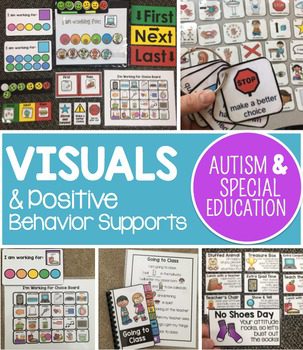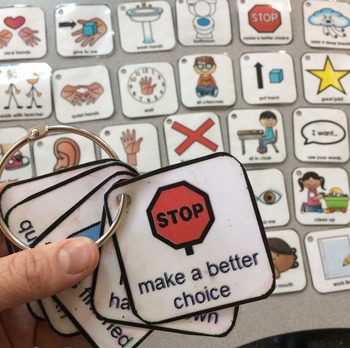
Social stories are narratives with visual elements that give students an engaging, relatable perspective. Students can connect to the stories being told from a first-person perspective, and the social stories become their own stories.
Using social stories in connection with teaching and processing before behaviors escalate can help lessen behavior problems and give students coping mechanisms before or as they struggle. Here are some ways to use social stories with your elementary students in special education.
Coping with Anger

In the positive behavior supports bundle, one social story is all about having ways to cope when students get mad. First, share the story “Sometimes I Feel Mad” with students during social skills or intervention time.
In addition, social studies like this one help de-escalate problem behavior when it starts. Help your students calm down when they are angry by sharing coping skills and techniques through this social story. Visual cues also help students understand when they need to use these techniques. Social stories help students recognize cues for when they are starting to feel angry. Students may also identify specific techniques that help them calm down.
Classroom Procedures

Use social stories to help students practice and understand daily routines and procedures. In the Positive Behavior Supports Bundle, students learn and review what to do when “Going to Class” with a social story that reminds them how to walk down the hall, enter the classroom, listen and behave in class, and leave the classroom.
These simple procedures may come quickly for some students, but these reminders are crucial for many students with special needs. Often, they are not being defiant or misbehaving purposefully. Social stories reinforce and remind them of the behaviors they should be exhibited before, during, and after class.
Peer Relationships

Of course, social stories are used to practice, well, being social! Developing friendships and learning how to interact with peers can be a struggle for students with special needs or behavior concerns. Sharing, using kind words, and proper ways to give affection are all essential aspects of “Being a Friend,” a social story included with the Positive Behavior Supports Bundle.
Some schools have peer programs (like “Circle of Friends”) where students practice social skills with grade-level peers that do not have special needs regarding behavior. Using positive peer role models in connection with social stories can help your students develop friendships and positive peer relationships. Even if there is no formal program at your school, use your own form of peer mentoring in your classroom by pairing students up with positive leaders.
Model Your Own Experiences
Pre-written social stories definitely help your students deal with emotions and behaviors in the classroom. Consider sharing your stories where you struggled (even if you embellish a little bit)!
“I remember one time when I got really upset about a friend taking my book. Here’s what I did to calm down.”
Normalizing triggers, emotions, and ways to navigate social situations helps your students in special education realize that they can behave and manage their own emotions in school, just like you did. It will also help your students feel confident in managing emotions, understanding classroom routines, and navigating friendships.
Try these social stories out with your students. The stories come complete with booklets and visuals, flip books, keychain visuals, token board templates, reward coupons and other resources in more than 80 pages of Positive Behavior Supports.
Leave a Reply